曼昆《经济学原理》英文版完整讲义丛externalities.ppt
曼昆《经济学原理》讲座讲义(英文)

Harcourt, Inc. items and derived items copyright © 2001 by Harcourt, Inc.
4. People respond to incentives.
Marginal changes in costs or benefits motivate people to respond. The decision to choose one alternative over another occurs when that alternative’s marginal benefits exceed its marginal costs!
Ten Principles of Economics
How People Make Decisions
People face tradeoffs. The cost of something is what you give up to get it. Rational people think at the margin. People respond to incentives.
Harcourt, Inc. items and derived items copyright © 2001 by Harcourt, Inc.
6. Markets are usually a good way to organize economic activity.
Because households and firms look at prices when deciding what to buy and sell, they unknowingly take into account the social costs of their actions. As a result, prices guide decision makers to reach outcomes that tend to maximize the welfare of society as a whole.
曼昆经济学原理ppt课件

参考资料:如何阅读本书
7. 教其他人 学习某种东西的最好的方法莫过于再教其他人, 比如学友或朋友
8. 不要忽略现实世界中的例子 阅读每章的案例研究和新闻摘录专栏。它们将帮 你看到新的术语,概念,模型,图表等是如何应 用到现实世界中的。当你阅读报纸或看晚间新闻 时,尝试着发现它们与你在教科书上所学知识的 联系
水平的影响远远小于生产率
25
整体经济如何运行
原理 9 :当政府发行了过多货币时,物价上升
▪ 通货膨胀:物价总水平的上升 ▪ 长期而言,通货膨胀总是由于货币数量的过度增长
而导致货币价值的下降所引起
▪ 政府创造货币的速度越快,通胀率越高
26
整体经济如何运行
原理 10 :社会面临通货膨胀与失业之间的短期权衡 取舍
间学习
▪ 想要更多的收入需要工作更长时间,这就使得休
息时间减少
▪ 保护环境意味着生产消费物品的资源减少 人们面临权衡取舍
▪ 社会面临一种重要的权衡取舍:
效率 vs. 平等
▪ 效率: 社会能从其稀缺资源中得到的最大利益 ▪ 平等: 经济成果在社会成员中平均分配 ▪ 权衡取舍:为使社会更加平等, 需要在富人与穷人
十倍以上
▪ 今天美国的生活水平比100年以前大约增长了
八倍
24
整体经济如何运行
原理 8 :一国的生活水平取决于它生产物品与 劳务的能力
▪ 决定生活水平的最重要因素:生产率,即每一单位劳
动投入所生产的物品与劳务数量
▪ 生产率取决于设备,劳动者的技能以及可用的技术 ▪ 其它因素(比如,工会组织,国外的竞争)对于生活
28
参考资料:如何阅读本书
3. 考考自己 在你开始阅读下一节之前,试着解决上节的“即问 即答”。并写下你的答案,与书后的答案进行核对。 如果你答错了,也许你就需要复习一下该节
曼昆《经济学原理》(宏观经济学分册)英文原版PPT课件
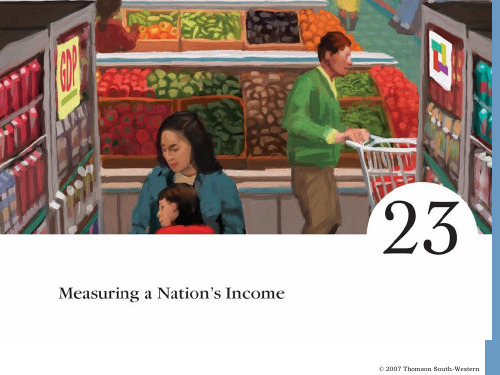
© 2007 Thomson South-Western
Table 2 Real and Nominal GDP
© 2007 Thomson South-Western
Table 2 Real and Nominal GDP
© 2007 Thomson South-Western
Table 2 Real and Nominal GDP
© 2007 Thomson South-Western
THE ECONOMY’S INCOME AND EXPENDITURE
• When judging whether the economy is doing well or poorly, it is natural to look at the total income that everyone in the economy is earning.
Y = C + I + G + NX
© 2007 Thomson South-Western
THE COMPONENTS OF GDP
• Consumption (C):
• The spending by households on goods and services, with the exception of purchases of new housing.
© 2007 Thomson South-Western
THE MEASUREMENT OF GROSS DOMESTIC PRODUCT
• The equality of income and expenditure can be illustrated with the circular-flow diagram.
外部性 曼昆经济学原理第七版PPT课件

– Impact on the bystander is beneficial
© 2015 Cengage Learning. All Rights Reserved. May not be copied, scanned, or duplicated, in whole or in part, except for use as
– Why markets sometimes fail to allocate resources efficiently
– How government policies can potentially improve the market’s allocation
– What kinds of policies are likely to work best
• Welfare economics: a recap
– Demand curve: value to consumers
• Prices they are willing to pay
– Supply curve: cost to suppliers – Equilibrium quantity and price
Externalities
• Externality
– The uncompensated impact of one person’s actions on the well-being of a bystander
– Market failure
• Negative externality
– Impact on the bystander is adverse
1
permitted in a license distributed with a certain product or service or otherwise on a password-protected website for classroom use.
曼昆《经济学原理》(宏观经济学分册)英文原版PPT课件

THE COMPONENTS OF GDP • GDP includes all items produced in the economy and sold legally n markets. • What Is Not Counted in GDP?
– Every transaction has a buyer and a seller. – Every dollar of spending by some buyer is a dollar of income for some seller.
© 2007 Thomson South-Western
Y = C + I + G + NX
© 2007 Thomson South-Western
THE COMPONENTS OF GDP • Consumption (C):
• The spending by households on goods and services, with the exception of purchases of new housing. • Investment (I):
© 2007 Thomson South-Western
Table 2 Real and Nominal GDP
© 2007 Thomson South-Western
Table 2 Real and Nominal GDP
© 2007 Thomson South-Western
Table 2 Real and Nominal GDP
• “. . . Final . . .” – It records only the value of final goods, not intermediate goods (the value is counted only once).
曼昆经济学原理英 Chap10

Positive Externalities in Production
When an externality benefits the bystanders, a positive externality exists.
Harcourt, Inc. items and derived items copyright © 2001 by Harcourt, Inc.
The Market for Aluminum and Welfare Economics
For each unit of aluminum produced, the social cost includes the private costs of the producers plus the cost to those bystanders adversely affected by the pollution.
Quantity of Aluminum
Negative Externalities in Production
The intersection of the demand curve and the social-cost curve determines the optimal output level.
Harcourt, Inc. items and derived items copyright © 2001 by Harcourt, Inc.
Market Failures: Externalities
When the impact on the bystander is adverse, the externality is called a negative externality.
曼昆经济学原理-第十章-外部性

Social value
0
OPTIMUM MARKET
Quantity 0
of Alcohol
Social
value
Demand
(private value)
QQ MARKET OPTIMUM
Quantity of Education
The Equivalence of Pigovian Taxes and Pollution Permits...
机器人的数量
Positive Externalities in Production
需求曲线与社会成本曲线的交点决定了社 会最适的产量水平。
最适产量水平超过均衡水平。 市场的生产量小于社会的合意数量。 生产的社会成本小于生产与消费的私人成本 。
外部性内在化: 补贴
政府多次使用补贴作为主要的方 式来尝试使正外部性内部化。
外部性内在化(Internalizing an externality )指改变激励,以使人 们考虑到自己行为的外部性。
Achieving the Socially Optimal Output
政府可以通过向生产者征税使外部 性内在化,从而均衡量减少到社会 最适水平。
生产产品的正外部性
当外部性给旁观者带来利益,正的外部 性就出现了。
Price of Aluminum
Cost of pollution
Social cost
Supply
(private cost)
Optimum
Equilibrium
Demand
(private value)
0
Qoptimum QMARKE
T
曼昆《经济学原理》英文版完整讲义丛elasticity精品文档45页
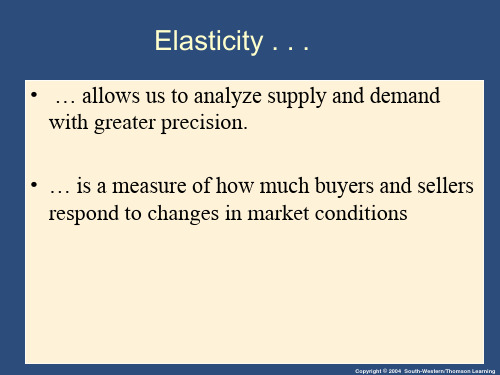
Copyright © 2004 South-Western/Thomson Learning
(2.(21001028.)00)1010001200% %2 2.00
Copyright © 2004 South-Western/Thomson Learning
The Midpoint Method: A Better Way to Calculate Percentage Changes and Elasticities • The midpoint formula is preferable when
increases from $2.00 to $2.20 and the amount
you buy falls from 10 to 8 cones, then your
elasticity of demand, using the midpoint
Elasticity . . .
• … allows us to analyze supply and demand with greater precision.
• … is a measure of how much buyers and sellers respond to changes in market conditions
Copyright © 2004 South-Western/Thomson Learning
The Price Elasticity of Demand and Its Determinants • Demand tends to be more elastic :
曼昆《经济学原理》(宏观经济学分册)英文原版PPT课件 25
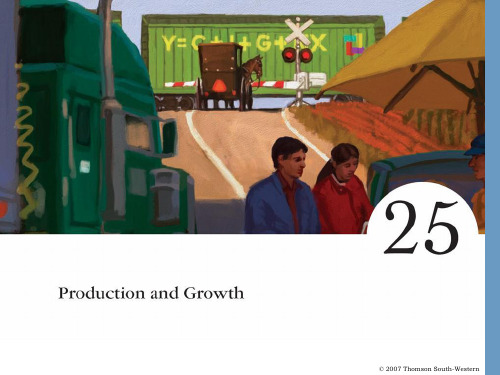
How Productivity Is Determined • Physical capital per worker is the stock of equipment and structures that are used to produce goods and services. • Physical capital includes:
© 2007 Thomson South-Western
How Productivity Is Determined • The inputs used to produce goods and services are called the factors of production. • The factors of production include:
© 2007 Thomson South-Western
FYI: The Production Function • The preceding equation says that productivity (Y/L) depends on:
• • • • physical capital per worker (K/L), human capital per worker (H/L), and natural resources per worker (N/L), as well as the state of technology (A).
• Y/ L = A F(1, K/L, H/L, N/L) • Where:
• • • • Y/L = output per worker K/L = physical capital per worker H/L = human capital per worker N/L = natural resources per worker
经济学原理(曼昆)10完美版PPT
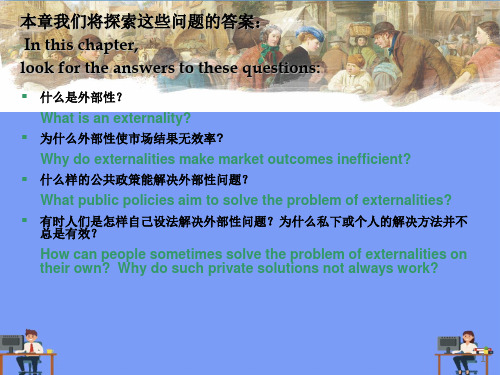
——由此,供给曲线将向
10
20 25 30 Q
上垂直移动距离为$1
(加仑)
外部性的内部化
〔 “Internalizing the Externality〞 〕
▪ 外部性的内在化:—— 即通过改变对人的鼓励,使人们在自己行为
时顾及自己行为的外部性影响
▪ 怎样使外部性内部化?
▪ 例如,征税
▪ 如果对卖者每卖出1加仑汽油征税$1,就会使
本章我们将探索这些问题的答案: In this chapter, look for the answers to these questions:
▪ 什么是外部性?
What is an externality?
▪ 为什么外部性使市场结果无效率?
Why do externalities make market outcomes inefficient?
Talking on cell phone while driving makes the roads less safe for others 什么样的公共政策能解决外部性问题?
▪ 当存在“外部性〞时,政府的公共政策能提高效 减排本钱高的企业不得不承担较高排污税负
当市场交易影响第三方的福利时,会产生外部性。 也可以排放小于30吨的SO2,并出售剩余额度
介绍 (Introduction)
▪ 自利的买者和卖者忽略了他们行为的外部本钱和
主动学习 1收益,因此,市场结果是无效率的
正外部性的分析 因为,要使政府干预有效率,也必须借助市场力量,例如,矫正税和可交易许可证制度都是借助市场力量才发挥作用的政府干预手段 主动学习 1 参考答案 欧洲从2005年1月开始允许碳排放量的交易
率
Chap10Externalities曼昆经济学原理,微观英文版

Chap10Externalities曼昆经济学原理,微 观英文版
Recall that: Adam Smith’s “invisible hand” of the marketplace leads selfinterested buyers and sellers in a market to maximize the total benefit that society can derive from a market.
Chap10Externalities曼 昆经济学原理,微观英文 版
Chapter 10
Copyright © 2001 by Harcourt, Inc. All rights reserved. Requests for permission to make copies of any part of the
work should be mailed to: Permissions Department, Harcourt College Publishers, Harcourt, Inc. items and derived items copyright © 2001 by Harc6o2u7rt7, ISnce.a Harbor Drive, Orlando, Florida 32887-6777.
Harcourt, Inc. items and derived items copyright © 2001 by Harcourt, Inc.
Chap10Externalities曼昆经济学 原理,微观英文版
Automobile exhaust Cigarette smoking Barking dogs (loud pets) Loud stereos in an apartment building
曼昆经济学原理——经济学十大原理PPT

Principle #7: Governments Can Sometimes Improve Market Outcomes
▪ 市场失灵(market failure:)市场本身不能有效配置资源的情
况 (when the market fails to allocate society’s resources efficiently)
▪ 从国外进口更便宜的物品而不用在国内自己生产
经济学十大原理
15
HOW PEOPLE INTERACT
原理 6 :市场通常是组织经济活动的一种好方法
Principle #6: Markets Are Usually A Good Way to Organize Economic Activity
▪ 市场(Market) : 大量的买者与卖者
Principle #9: Prices rise when the government prints too much money.
▪ 通货膨胀(Inflation ):物价总水平的上升 ▪ 长期而言,通货膨胀总是由于货币数量的过度增长
▪ 市场经济:许多企业和家庭在物品和劳务市场上相
互交易,通过他们的分散决策来配置资源的经济
▪ 亚当.斯密在《国富论》(1776)中的著名观察结
果:
家庭和企业仿佛被一只“看不见的手” ( an invisible hand)所指引,在市场上相互交易, 并增进整体经济的福利
经济学十大原理
17
亚当·斯密(Adam Smith):经济 学鼻祖(1723~1790)是经济学的 主要创立者。于1776年发表著作 《An Inquiry into the Nature and Causes of the Wealth of Nations》 《国民财富的性质和原因的研究》 (简称《国富论》》
曼昆《经济学原理》英文版完整讲义丛externalities

EXTERNALITIES AND MARKET INEFFICIENCY
• Positive Externalities
• Immunizations • Restored historic buildings • Research into new technologies
路漫漫其悠远
曼昆《经济学原理》英文版完整讲义 丛externalities
• The optimal output level is more than the equilibrium quantity.
• The market produces a smaller quantity than is socially desirable.
• The social value of the good exceeds the private value of the good.
路漫漫其悠远
曼昆《经济学原理》英文版完整讲义 丛externalities
Figure 3 Education and the Social Optimum
Price of Education
Supply (private cost)
Social value Demand (private value)
Figure 1 The Market for Aluminum
Price of Aluminum
Supply (private cost)
Equilibrium
Demand (private value)
0
QMARKET
QuantityBiblioteka ofAluminumCopyright © 2004 South-Western
曼昆《经济学原理》英文原版重要知识点课件
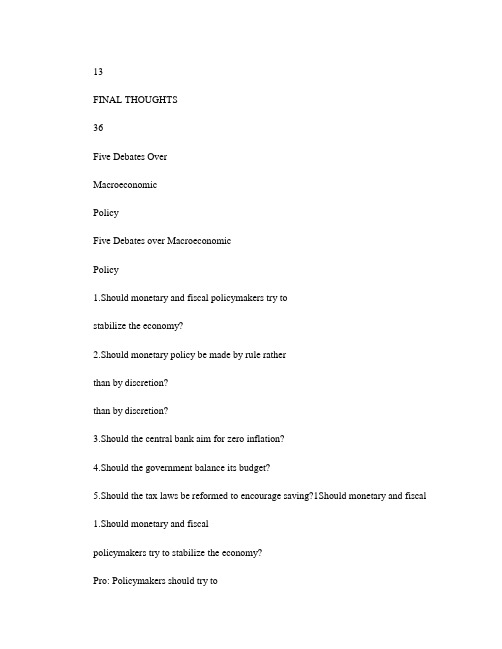
13FINAL THOUGHTS36Five Debates OverMacroeconomicPolicyFive Debates over MacroeconomicPolicy1.Should monetary and fiscal policymakers try tostabilize the economy?2.Should monetary policy be made by rule ratherthan by discretion?than by discretion?3.Should the central bank aim for zero inflation?4.Should the government balance its budget?5.Should the tax laws be reformed to encourage saving?1Should monetary and fiscal 1.Should monetary and fiscalpolicymakers try to stabilize the economy?Pro: Policymakers should try tostabilize the economy•The economy is inherently unstable, and left on its own will fluctuate.•Policy can manage aggregate demand in order to offset this inherent instability and reduce the to offset this inherent instability and reduce the severity of economic fluctuations.Pro: Policymakers should try tostabilize the economy •There is no reason for society to suffer through the booms and busts of the business cycle.•Monetary and fiscal policy can stabilize aggregate demand and,thereby,production and aggregate demand and, thereby, production and employment.Con: Policymakers should not try to stabilize the economy •Monetary policy affects the economy with long and unpredictable lags between the need to act and the time that it takes for these policies to work.•Many studies indicate that changes in monetary policy have little effect on aggregate demand until about six months after the change is made.Con: Policymakers should not try to stabilize the economy •Fiscal policy works wi th a lag because of the long political process that governs changes in spending and taxes.•It can take years to propose,pass,andIt can take years to propose, pass, and implement a major change in fiscal policy.Con: Policymakers should not try to stabilize the economy•All too often policymakers can inadvertently exacerbate rather than mitigate the magnitude of economic fluctuations.•It might be desirable if policy makers couldPro: Monetary policy should bemade by rule •Discretionary monetary policy c an suffer fromincompetence and abuse of power.•To the extent that central bankers allythemselves with politicians,discretionary themselves with politicians, discretionarypolicy can lead to economic fluctuations thatreflect the electoral calendar—the politicalbusiness cycle.Pro: Monetary policy should bemade by rule•There may be a discrepancy between what policymakers say they will do and what they actually do—called time inconsistency of policy.p y•Because policymakers are so often time inconsist ent, people are skeptical when central bankers announce their intentions to reduce the rate of inflation.Pro: Monetary policy should bemade by rule •Committing the Fed to a moderate and steady growth of the money supply would limit incompetence, abuse of power, and time inconsistency.y Con: Monetary policy should not bemade by rule•An important advantage of discretionary monetary policy is its flexibility.•Inflexible policies will limit the ability of policymakers to respond to changing economic policymakers to respond to changing economic circumstances.Con: Monetary policy should not bemade by rule•The alleged problems with discretion and abuseof power are largely hypothetical.•Also, the importance of the political businesscycle is far from clear.cycle is far from clear.3.Should the central bank aim for zeroinflation?Pro: The central bank should aim forzero inflation•Inflation confers no benefit to society, but it imposes several real costs.•Shoeleather costs•Menu costs•Increased variabil ity of relative prices•Unintended changes in tax liabilities•Confusion and inconvenience•Arbitrary redistribution of wealth Pro: The central bank should aim forzero inflation•Reducing inflation is a policy with temporary costs and permanent benefits.•Once the disinflationary recession is over, the benefits of zero inflation would persist. benefits of zero inflation would persist.Con: The central bank should notaim for zero inflation•Zero inflation is probably unattainable, and toget there involves output, unemployment, andsocial costs that are too high.•Policymakers can reduce many of the costs ofPolicymakers can reduce many of the costs ofinflation without actually reducing inflation. 4.Should fiscal policymakers reducethe government debt?Pro: The government shouldbalance its budget •Budget deficits impose an unjustifiable burden on future generations by raising their taxes and lowering their incomes.•When the debts and accumulated interest come When the debts and accumulated interest come due, future taxpayers will face a difficult choice:•They can pay higher taxes, enjoy less governmentspending, or both.Pro: The government shouldbalance its budget•By shifting the cost of current government benefits to future generations, there is a bias against future taxpayers.•Deficits reduce national saving,leading to a Deficits reduce national saving, leading to a smaller stock of capital, which reduces productivity and growth.Con: The government should notbalance its budget•The problem with th e deficit is often exaggerated.•The transfer of debt to the future may be justified because some government purchases justified because some government purchases produce benefits well into the future.Con: The government should notbalance its budget•The government debt can continue to rise because population growth and technological progress increase the nation’s ability to pay the interest on the debt.5.Should the tax laws be reformed to encourage saving?Pro: Tax laws should be reformed toencourage saving•A nation’s saving rate is a key determinant of its long-run economic prosperity.•A nation’s productive capability is determined largely by how much it saves and invests for the largely by how much it saves and invests for the future.•When the savin g rate is higher, more resources are available for investment in new plant and equipment.Pro: Tax laws should be reformed toencourage saving•The U.S. tax system discourages saving in many ways, such as by heavily taxing the income from capital and by reducing benefits for those who have accumulated wealth.Pro: Tax laws should be reformed toencourage saving•The consequences of high capital income tax policies are reduced saving, reduced capital accumulation, lower labor productivity, and reduced economic growth.gPro: Tax laws should be reformed toencourage saving•An alternative to current tax policies advocated by many economists is a consumption taxconsumption tax.•With a consumption tax, a household pays taxes based on what it spends not on what it earns. based on what it spends not on what it earns.•Income that is saved is exempt from taxation untilthe saving is later withdrawn and spent onconsumption goods.Con: Tax laws should not bereformed to encourage saving •Many of the changes in tax la ws to stimulate saving would primarily benefit the wealthy.•High-income households save a higher fraction of their income than low-income households.•Any tax change that favors people who save willalso tend to favor people with high incomes.2009-11-1 C on: Tax laws should not be reformed to encourage saving • Reducing the tax burden on the wealthy would lead to a less egalitarian society. • This would also force the government to raise the tax burden on the poor. Con: Tax laws should not be reformed to e ncourage saving • Raising public saving by eliminating the government’s budget deficit would provide a more direct and equitable way to increase national saving.g Summary • Advocates of active monetary and fiscal policy view the economy as inherently unst able and believe policy can be used to offset this inherent instability. y • Critics of active policy emphasize that policy affects the economy with a lag and our ability to forecast future economic conditions is poor, both of which can lead to policybein g destabilizing. Summary • Advocates of rules for monetary policy argue that discretionary policy can suffer from incompetence, abuse of power, and time inconsistency. y • Critics of rules for monetary policy argue that discretionary policy is more flexibl e in responding to economic circumstances. Summary • Advocates of a zero-inflation target emphasize that inflation has many costs and few if any benefits. zero-inflation • Critics of a zero inflation target claim that moderate inflation imposes only small costs on society, whereas the recession necessary to reduce inflation is quite costly. Summary • Advocates of reducing the government debt argue that the debt imposes a burden on future generations by raising their taxes and lowering their incomes. • Criti cs of reducing the government debt argue that the debt is only one small piece of fiscal policy. 62009-11-1 Summary • Advocates of tax incentives for saving point out that our society discourages saving in many ways such as taxing income from capital and reducing benefits for those who have g accumulated wealth. • Critics of tax incentives argue that many proposed changes to stimulate saving would primarily benefit the wealthy and also might have only a small effect on private saving. 7。
《曼昆经济学原理》课件

比较优势
各国根据自身的资源、技术和 成本优势进行专业化生产,实
现全球资源的最优配置。
贸易条件
贸易条件的变化对出口国和进 口国的影响,以及贸易条件与
经济增长的关系。
贸易政策
自由贸易政策和保护贸易政策 的优缺点,以及政策制定时应
考虑的因素。
国际金融
国际收支
国际收支平衡表的构成,以及影响国际收支 的因素。
国际货币体系
国际金本位制、布雷顿森林体系和牙买加体 系的比较和演变。
外汇市场
外汇市场的参与者、交易方式和汇率决定机 制。
资本流动
资本流动的原因、影响和风险。
汇率制度
固定汇率制度
固定汇率制度的优点和缺点,以及应 对货币投机的策略。
浮动汇率制度
浮动汇率制度的优点和缺点,以及汇 率浮动对经济的影响。
汇率目标区
国际合作在全球化进程中的作用和 必要性。
04
PART 05
经济学理论
REPORTING
古典经济学
01
总结词
古典经济学主张自由市场经济,强调市场供需关系和价格机制的自发调
节作用。
02 03
详细描述
古典经济学家认为,市场经济在自由竞争下能够达到最优资源配置,价 格、工资和利润等变量由市场供需决定,政府只需充当守夜人角色,不 应对经济进行过多干预。
《曼昆经济学原理》 PPT课件
REPORTING
• 导言 • 微观经济学 • 宏观经济学 • 国际经济学 • 经济学理论
目录
PART 01
导言
REPORTING
经济学定义
总结词
经济学是一门研究人类经济行为和现象的社会科学。
详细描述
《经济学原理·曼昆·第三版》第10章

The Market for Aluminum...
Price of Aluminum Suppium
Demand (private value) 0
QMARKE
T
Quantity of Aluminum
10.1.1 负的外部性 negative externality
案例研究:技术的溢出效应与产业政策
一些经济学家认为,技术溢出效应是普遍存在的,政府应该鼓励 这些产生最大溢出效应的行业。 政府旨在促进技术进步行业的经济干预称为技术政策。 另一些经济学家怀疑技术政策。即使技术溢出效应是普遍的,技 术政策的成功要求政府能衡量不同市场溢出效应的大小。这个衡 量问题是极困难的。此外,没有准确的衡量,政治制度最终会补 贴那些最有政治影响的行业,而不是那些产生了最大正外部性的 行业。 大多数经济学家赞同的一种技术政策是专利保护。专利法通过给 予发明者在一定时期内排他性地使用自己的发明而保护了发明者 的权利。
说明为什么当存在外部性时最优量不同于市场量
定义科斯定理 解释交易成本会如何阻碍外部性的私人解决 说明庇古税和污染许可证的潜在相等性
Prologue
Markets do many things well, but they do not do everything well. In this chapter we begin our study of another of the Ten Principles of Economics: Governments can sometimes improve market outcomes. We examine why markets sometimes fail to allocate resources efficiently, how government policies can potentially improve the market’s allocation, and what kinds of policies are likely to work best. The market failures examined in this chapter fall under a general category called externalities. An externality arises when a person engages in an activity that influences the well-being of a bystander and yet neither pays nor receives any compensation for that effect. If the impact on the bystander is adverse, it is called a negative externality; if it is beneficial, it is called a positive externality.
曼昆《经济学原理》英文版完整讲义丛externalitiesPPT资料36页

. . . when a person engages in an activity that influences the well-being of a bystander and yet neither pays nor receives any compensation for that effect.
• Negative Externalities
• Automobile exhaust • Cigarette smoking • Barking dogs (loud pets) • Loud stereos in an apartment building
Copyright © 2004 South-Western
4
THE ECONOMICS OF THE PUBLIC SECTOR
Externalities
10
Copyright©2004 South-Western
• Recall: Adam Smith’s “invisible hand” of the marketplace leads self-interested buyers and sellers in a market to maximize the total benefit that society can derive from a market.
EXTERNALITIES AND MARKET INEFFICIENCY
• Positive Externalities
• Immunizations • Restored historic buildings • Research into new technologies
- 1、下载文档前请自行甄别文档内容的完整性,平台不提供额外的编辑、内容补充、找答案等附加服务。
- 2、"仅部分预览"的文档,不可在线预览部分如存在完整性等问题,可反馈申请退款(可完整预览的文档不适用该条件!)。
- 3、如文档侵犯您的权益,请联系客服反馈,我们会尽快为您处理(人工客服工作时间:9:00-18:30)。
• Automobile exhaust • Cigarette smoking • Barking dogs (loud pets) • Loud stereos in an apartment building
Copyright © 2004 South-Western
• When the impact on the bystander is beneficial, the externality is called a positive externality.
Copyright © 2004 South-Western
EXTERNALITIES AND MARKET INEFFICIENCY
• Externalities cause markets to be inefficient, and thus fail to maximize total surplus.
Copyright © 2004 South-Western
EXTERNALITIES AND MARKET INEFFICIENCY
4
THE ECONOMICS OF THE PUBLIC SECTOR
Externalities
10
Copyright©2004 South-Wemith’s “invisible hand” of the marketplace leads self-interested buyers and sellers in a market to maximize the total benefit that society can derive from a market.
EXTERNALITIES AND MARKET INEFFICIENCY
• Positive Externalities
• Immunizations • Restored historic buildings • Research into new technologies
Copyright © 2004 South-Western
Copyright © 2004 South-Western
Welfare Economics: A Recap • The Market for Aluminum
• For each unit of aluminum produced, the social cost includes the private costs of the producers plus the cost to those bystanders adversely affected by the pollution.
Figure 1 The Market for Aluminum
Price of Aluminum
Supply (private cost)
Equilibrium
Demand (private value)
0
QMARKET
Quantity of
Aluminum
Copyright © 2004 South-Western
But market failures can still happen.
Copyright © 2004 South-Western
EXTERNALITIES AND MARKET INEFFICIENCY
• An externality refers to the uncompensated impact of one person’s actions on the wellbeing of a bystander.
Copyright © 2004 South-Western
EXTERNALITIES AND MARKET INEFFICIENCY
• When the impact on the bystander is adverse, the externality is called a negative externality.
EXTERNALITIES AND MARKET INEFFICIENCY
• Negative externalities lead markets to produce a larger quantity than is socially desirable.
• Positive externalities lead markets to produce a larger quantity than is socially desirable.
Copyright © 2004 South-Western
Welfare Economics: A Recap
• The Market for Aluminum
• The quantity produced and consumed in the market equilibrium is efficient in the sense that it maximizes the sum of producer and consumer surplus.
• If the aluminum factories emit pollution (a negative externality), then the cost to society of producing aluminum is larger than the cost to aluminum producers.
• An externality arises...
. . . when a person engages in an activity that influences the well-being of a bystander and yet neither pays nor receives any compensation for that effect.
